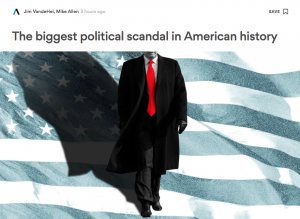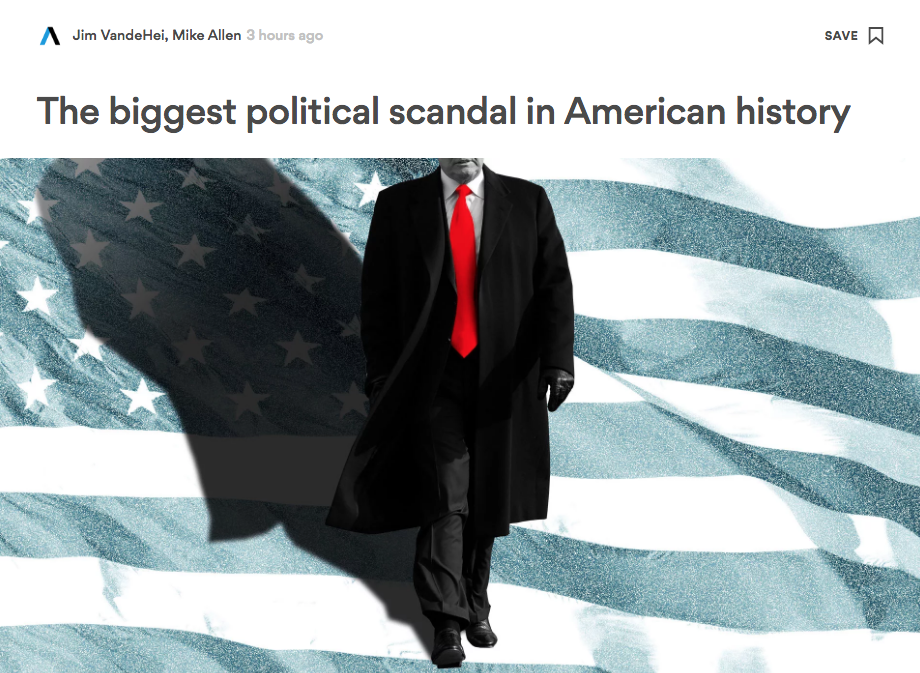The Ineffable Boiling Frog of Trump Scandal
In the last several days, two outlets have tried — but (in my opinion) failed — to communicate the sheer scale of the President’s corruption. Today, that bastion of warmed over conventional wisdom, Axios, deemed Trump’s Russian conspiracy “the biggest political scandal in American history.”
 They miss most of the key details (and treat Trump’s contacts with Russian officials as the crime, when that’s not by itself one). Even in a piece invoking the Teapot Dome Scandal, they don’t seem to see the outlines of a quid pro quo bribe, Tower and dirt for sanctions relief. There’s no mention of Paul Manafort at all, much less one describing how he shared polling data in a meeting where he also discussed sanctions relief.
They miss most of the key details (and treat Trump’s contacts with Russian officials as the crime, when that’s not by itself one). Even in a piece invoking the Teapot Dome Scandal, they don’t seem to see the outlines of a quid pro quo bribe, Tower and dirt for sanctions relief. There’s no mention of Paul Manafort at all, much less one describing how he shared polling data in a meeting where he also discussed sanctions relief.
And I don’t think the Mueller investigation really has delivered one of the biggest counterintelligence cases in history (which may be a mis-citation of this Garrett Graff article).
More remarkably, the Axios founders don’t seem to be able to get their arms around where this scandal ends, in part because some of the other stuff Trump has done — monetizing the Presidency via other foreign powers or various properties — are separate from the Russian part of Trump’s scandals.
Tuesday, Greg Sargent attempted a different approach, cataloging all the things that Republicans in Congress think should not be investigated by Congress. He came up with this list:
- Materials relating to any foreign government payments to Trump’s businesses, which might constitute violations of the Constitution’s emoluments clause.
- Materials that might shed light on Trump’s negotiations over the duration of a real estate project in Moscow, which Trump concealed from the voters even as the GOP primaries were underway.
- Materials that might show whether Trump’s lawyers had a hand in rewriting former lawyer Michael Cohen’s testimony to Congress falsifying the timeline of those negotiations.
- Materials that might illuminate more detail about Trump’s numerous efforts to obstruct the FBI/Mueller investigation.
- Materials that would shed more light on the criminal hush-money scheme that Cohen carried out, allegedly at Trump’s direction, and on Trump’s reimbursement of those payments.
This list is based on the HJC list of document requests, and so is limited to people who’ve already (publicly) been asked for documents. But even there, it doesn’t capture why some of these things matter — again, including the appearance of a quid quo pro bribe trading the Trump Tower for sanctions relief. Nor does it incorporate the full scope of kinds of crimes listed here. This list doesn’t include the range of lies told, not just by Cohen but by Roger Stone and Don Jr and others, nor does it consider the import of Cambridge Analytica and Manafort sharing polling data with the Russians.
And, of course, because Sargent works backwards from the HJC list, he doesn’t include issues already being investigated by other committees, such as how Trump’s ICE keeps losing immigrant children, or why he forced aides to give his daughter and her husband security clearances that they clearly weren’t suited for.
I raise this not to criticize, but instead to observe that we’re at a point where journalists are struggling to communicate the full scale of Trump’s corruption, even just that corruption tied exclusively to the Russian investigation. That’s partly been a result of his media approach, treating each day as a new opportunity to replace yesterday’s spectacle with a new one. It’s partly because of the boiling frog effect: we’ve had piecemeal disclosures over two years, and few journalists have taken stock along the way to see what the actual court evidentiary record amounts to. And even there, we often forget to add in the truly breathtaking corruption of Administration aides like Scott Pruitt or Ryan Zinke, or of current Secretary of Commerce Wilbur Ross.
I’ve been thinking about this a lot of late — I don’t pretend to be able to get my brain around anything beyond the Russian investigation, to the extent even that is doable. It seems that we need to start trying to quantify this not in terms of names or actions but instead in terms of harm to the nation.
Just as one example, even the judges in the Russian investigation have — across the board — seen Trump’s flunkies to be selling out the interest of the United States, perhaps for Trump personally, perhaps for self-dealing, perhaps for foreign associates. Whatever crimes (or not) Trump committed, because he and his flunkies refuse to put the interest of the country first, it has consequences for Americans, including the constituents of members of Congress who want to ignore all this corruption.
We’ve been boiling frogs for several years here. But it’s time to take stock on the bottom line effect that Trump’s corruption has had on the country, and holding Republican enablers accountable for that damage.


